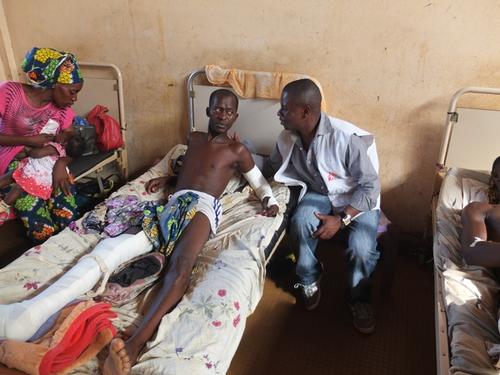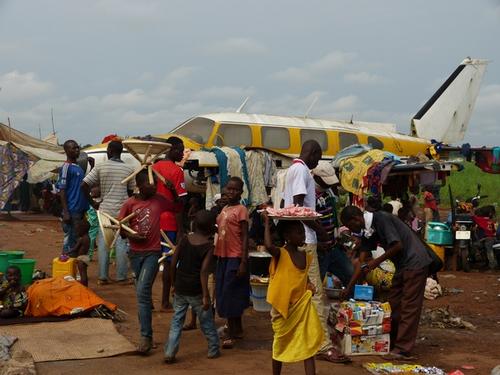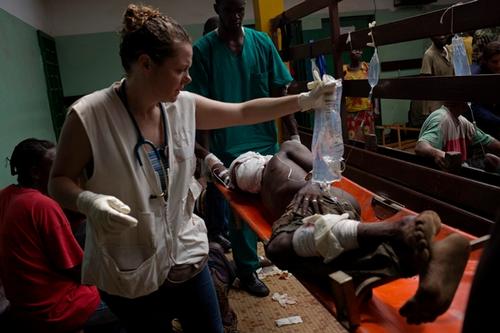Médecins Sans Frontières (MSF) conducted an assessment of the health situation and medical needs at the beginning of May in the east of Central African Republic, an area particularly affected by the Seleka offensive at the end of last year and beginning of 2013. While healthcare facilities were already in a state of collapse, this has been exacerbated by the violence and health risks are starting to appear. Brigitte Doppler, the nurse in charge of the assessment, provides an update.

“According to OCHA
The health situation is critical. Due to the insecurity and that people were forced to flee, there has been less agricultural activity and the upcoming September harvest is expected to see a shortfall. The threat of a nutrition crisis is all too real. In addition, the health authorities in the areas we have visited have reported a surge in malaria. Due to the onset of the rainy season, population displacements and shortage of drugs, outbreaks of malaria and contagious faecal-oral diseases (cholera, for example) are to be feared. We have observed an increase in cases of typhoid in Bambari.
The collapse of health facilities and lack of access to medical care have been exacerbated by the violence, looting and abuses that occurred during the Seleka offensive. Most staff deserted health centres to take refuge in the bush or go to the capital city Bangui. Almost all the facilities have been left empty and some have been looted. The routine vaccination programme has been suspended either because the cold chain cannot be maintained, or because equipment and vehicles have been stolen or damaged. Apart from MSF donations, there have been no supplies of drugs and medical equipment and there are no blood bags left. Three children died from severe anaemia during our visit to the hospital in Bria because they could not get a blood transfusion.
Bambari has received donations. The medical personnel have returned and the hospital was not looted and is able to function. On 30 May, MSF donated blood bags, basic supplies for the operating theatre, screening tests, malaria treatments and antibiotics to Grimari health centre and Bambari hospital. But Bria has been totally deserted. In health region 5, distances between health facilities are substantial and roads become impassable from June to August because of the rains. Since the donation made by MSF in December 2012, the region has received no drugs whatsoever. Almost all the health facilities have been looted and closed down as their equipment has been stolen. There are no ambulances and the health workers have fled. Malaria cases represent 82 per cent of consultations at the hospital. The price of basic necessities has double or even tripled. MSF is going to donate emergency kits for 10,000 people for three months, drugs, screening tests, malaria treatments, antibiotics and blood bags, etc., to restock health centres and the hospital before the area becomes impracticable. These supplies will be transported from Bria to accessible outlying facilities in two MSF vehicles; deliveries will be made to the more inaccessible facilities by motorbike or carried on people’s backs. We will also provide local health worker teams with fuel to enable them to pass on the supplies to those areas where our teams cannot go due to the lack of security.
We are going to monitor the epidemiological situation closely and stand ready to intervene in the event of an outbreak of malaria, cholera, malnutrition, meningitis or polio, etc. We are looking into conducting exploratory missions in more areas and the possibility of other interventions.”
Malaria alert
Treating malaria is one of MSF’s priorities in Central African Republic. In Paoua, MSF diagnosed and treated over 15,600 cases in the period from January to May 2013. Four hundred and sixty eight patients had to be hospitalised, 425 of them in the paediatric unit. Six point one per cent of these children died. MSF also treated 1,236 pregnant women for malaria.
MSF has been working in Central African Republic since 1996. The organisation is present throughout the country – regardless of which side of the conflict is in control – and runs 8 projects in 5 of the 7 health districts. MSF supports 7 hospitals and around 38 health centres with primary health care, HIV and tuberculosis treatment, malnutrition, neglected diseases, immunisation, surgery, etc.





